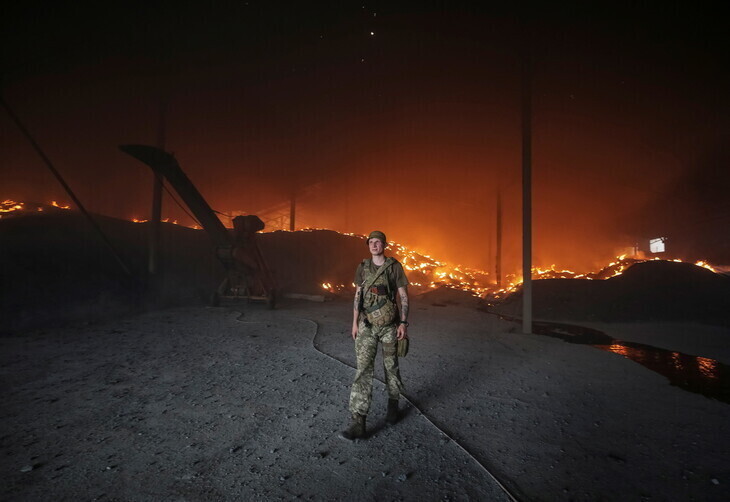hankyoreh
Links to other country sites 다른 나라 사이트 링크
[Column] Sometimes you have no choice but to make a deal with the devil


By Gil Yun-hyung, international news editor
If friends of Ukraine read this article, they may slam me for being a filthy hypocrite.
As we all know, humanity has been placed in a dilemma of indescribable complexity since Vladimir Putin invaded Ukraine on Feb. 24. Putin’s violent attempt to change the status quo in Europe by force is undeniably a frontal assault on the order that humanity has built since World War II.
With enormous effort, the Ukrainians thwarted Putin’s plan to seize Kyiv and “decapitate” the government of Ukrainian President Volodymyr Zelenskyy, bringing the war to a swift conclusion. I will never forget how Zelenskyy monitored the initial state of the war all night and then gathered his top officials on the streets of Kyiv on the war’s second day to reassure the public that they would defend the state and the country’s independence.
Since then, the Ukrainians have kept up a vigorous resistance, backed by military aid from the US and Europe. But since the main arena of the war shifted from the vicinity of Kyiv to the eastern region of Donbas in mid-April, it has become obvious that the Russian military has the upper hand. On May 20, Russia’s Ministry of Defense declared that the southeastern stronghold of Mariupol had been completely subjugated, and 95% of the eastern oblast of Luhansk has fallen in the subsequent offensive.
While I would like Ukraine to have the satisfaction of repelling Russia’s unjust onslaught, my emotional response has been complicated by Putin’s repeated blatant and shameless threats about using nuclear weapons since initiating hostilities. On Feb. 27, four days into the war, Putin ordered Russia’s nuclear deterrence forces to be placed on high alert.
Since then, the Russian authorities have threatened to use nuclear weapons if they come under an “existential threat.” While it’s impossible to know exactly what such a threat might be, I suspect Putin is referring to Russia’s national status being irreversibly damaged and his own political position being decisively endangered by a grave failure in the war.
That would suggest that the threat of humanity being engulfed in nuclear war grows greater with every skirmish that Zelenskyy wins. “A dilemma of indescribable complexity” seems to be the only way to describe such a situation.
The New York Times remarked in an editorial on May 19 that the Ukraine war was “entering a new and complicated phase” and opined that “it is still not in America’s best interest to plunge into an all-out war with Russia.” That editorial fanned the flames of what has been called the Kissinger vs. Soros debate.
Former US Secretary of State Henry Kissinger said during a speech at the World Economic Forum on May 23 that Ukraine should give up some of its territory to reach a compromise with Russia to prevent a greater tragedy. The very next day, George Soros argued that defeating Putin as quickly as possible is the best way to defend civilization.
That debate has split Europe down the middle, with the big powers of Germany, France and Italy siding with Kissinger’s realism and Poland and the three Baltic states leaning toward Soros because they’re directly exposed to the Russian security threat.
In an attempt to sort out my mental dilemma, I turned to my copy of “The Eastern Front,” by Takeshi Oki, a recent bestseller in Japan. The World War II campaign between Nazi Germany and the Soviet Union, which began in June 1941 and lasted for four years, can be summarized as one group trying to annihilate another group only to suffer a disastrous and crushing counterattack.
The most striking characteristic of this war is that it represented a conflict between worldviews, in which Nazism (in Germany) and Bolshevism (in the Soviet Union) refused to coexist and tried to wipe each other off the face of the earth. That is why Hitler didn’t try to negotiate an end to the war even after all hope of victory was extinguished by Germany’s decisive defeats at Stalingrad and Kursk. I won’t even mention the pain that humankind, and women in particular, suffered as a result. Sometimes, you have to make a deal with the devil.
If we take a clear-eyed look at the current situation of the war, it appears impossible for the Ukrainian military to retake the Crimean Peninsula, which Russia annexed in March 2014, or the regions of Luhansk and Donetsk, where Russia has concentrated its offensive. If Ukraine were to reclaim those regions through some miracle, it could lead to a nuclear war in Europe.
While recognizing that this will sound as hateful to Ukrainians as giving up Dokdo to the Japanese in a hypothetical occupation would be to Koreans, it’s time to restart the peace negotiations in Istanbul that have been on hold since late March.
Please direct questions or comments to [english@hani.co.kr]

Editorial・opinion
![[Editorial] Perilous stakes of Trump’s rhetoric around US troop pullout from Korea [Editorial] Perilous stakes of Trump’s rhetoric around US troop pullout from Korea](https://flexible.img.hani.co.kr/flexible/normal/500/300/imgdb/original/2024/0509/221715238827911.jpg) [Editorial] Perilous stakes of Trump’s rhetoric around US troop pullout from Korea
[Editorial] Perilous stakes of Trump’s rhetoric around US troop pullout from Korea![[Guest essay] Preventing Korean Peninsula from becoming front line of new cold war [Guest essay] Preventing Korean Peninsula from becoming front line of new cold war](https://flexible.img.hani.co.kr/flexible/normal/500/300/imgdb/original/2024/0507/7217150679227807.jpg) [Guest essay] Preventing Korean Peninsula from becoming front line of new cold war
[Guest essay] Preventing Korean Peninsula from becoming front line of new cold war- [Column] The state is back — but is it in business?
- [Column] Life on our Trisolaris
- [Editorial] Penalties for airing allegations against Korea’s first lady endanger free press
- [Editorial] Yoon must halt procurement of SM-3 interceptor missiles
- [Guest essay] Maybe Korea’s rapid population decline is an opportunity, not a crisis
- [Column] Can Yoon steer diplomacy with Russia, China back on track?
- [Column] Season 2 of special prosecutor probe may be coming to Korea soon
- [Column] Park Geun-hye déjà vu in Yoon Suk-yeol
Most viewed articles
- 1Korea likely to shave off 1 trillion won from Indonesia’s KF-21 contribution price tag
- 2Nuclear South Korea? The hidden implication of hints at US troop withdrawal
- 3[Editorial] Perilous stakes of Trump’s rhetoric around US troop pullout from Korea
- 4With Naver’s inside director at Line gone, buyout negotiations appear to be well underway
- 5In Yoon’s Korea, a government ‘of, by and for prosecutors,’ says civic group
- 6[Column] ‘Choson’: Is it time we start referring to N. Korea in its own terms?
- 7‘Free Palestine!’: Anti-war protest wave comes to Korean campuses
- 8How many more children like Hind Rajab must die by Israel’s hand?
- 9Overseeing ‘super-large’ rocket drill, Kim Jong-un calls for bolstered war deterrence
- 10[Photo] ‘End the genocide in Gaza’: Students in Korea join global anti-war protest wave